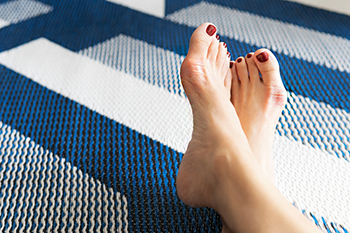
A bunion is a deformity of the joint at the base of the big toe. Bunions develop when the first metatarsal bone of the foot turns outward and the big toe points inward toward the other toes. This causes the joint to extend out from the foot. A bunion can become painful and interfere with walking and exercising as the joint becomes inflamed. It can be difficult to find shoes that accommodate a bunion, and it is best to avoid any additional pressure on the misaligned joint. Women are more likely to develop bunions because they tend to wear narrow shoes and high heels. Bunions can also be genetic and may result due to abnormal foot structures and shapes. Those with low arches and loose joints or tendons, as well as people who stand on their feet for prolonged periods, are also at increased risk for developing bunions. If you have a painful bunion, it is suggested you see a podiatrist who can provide alternative treatment options to help you live more comfortably.
If you are suffering from bunions, contact Matthew McQuaid, DPM of Lake Mendocino Podiatry. Our doctor can provide the care you need to keep you pain-free and on your feet.
What Is a Bunion?
A bunion is formed of swollen tissue or an enlargement of boney growth, usually located at the base joint of the toe that connects to the foot. The swelling occurs due to the bones in the big toe shifting inward, which impacts the other toes of the foot. This causes the area around the base of the big toe to become inflamed and painful.
Why Do Bunions Form?
Genetics – Susceptibility to bunions are often hereditary
Stress on the feet – Poorly fitted and uncomfortable footwear that places stress on feet, such as heels, can worsen existing bunions
How Are Bunions Diagnosed?
Doctors often perform two tests – blood tests and x-rays – when trying to diagnose bunions, especially in the early stages of development. Blood tests help determine if the foot pain is being caused by something else, such as arthritis, while x-rays provide a clear picture of your bone structure to your doctor.
How Are Bunions Treated?
- Refrain from wearing heels or similar shoes that cause discomfort
- Select wider shoes that can provide more comfort and reduce pain
- Anti-inflammatory and pain management drugs
- Orthotics or foot inserts
- Surgery
If you have any questions, please feel free to contact our offices located in Lakeport and Ukiah, CA . We offer the newest diagnostic and treatment technologies for all your foot care needs.
